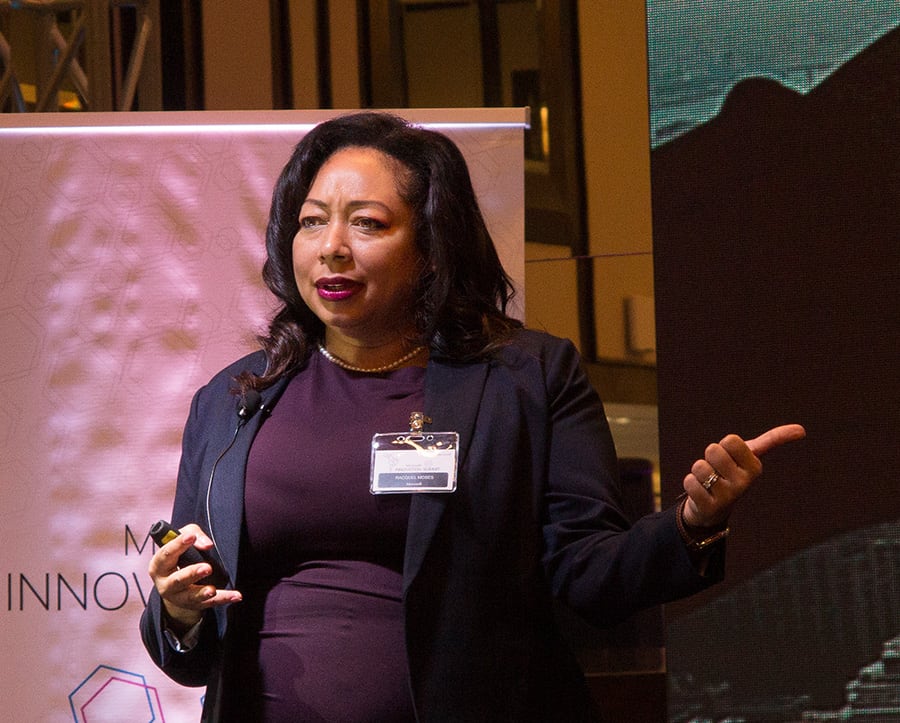
Above: Racquel Moses speaking at the Microsoft Innovation Summit. Photo by Mark Lyndersay. Click to enlarge images.
Originally published in NewsdayTT’s Business Day on December 14, 2017
At Microsoft’s Innovation Summit on Tuesday, there was a strong flavour of new to a company that’s been operating in T&T for more than two decades.
Key personnel were largely new to their roles. Charles Arizmendi, Director of Marketing and Azure Business Lead and Facundo Montiero, Product Manager for Cloud and Enterprise have been in their new role at the LaTam division for just six months.
Racquel Moses, Country Manager and Public Sector Lead for Microsoft T&T is just three months into the role.
Also new is the subdivision of the Latin American business sector, into three distinct regions, Central America, South America and the Caribbean, each of which will be targeted with regionally appropriate strategies.
“Our plan for the Caribbean region,” said Arizmendi of the reorganisation, in the works for the last three years, “is to become the number one cloud provider…in some [islands] we are already there and in others we are making gains.”
“It helps to align the investments, but it is also a big bet, particularly in terms of headcount.”
The regional split won’t affect the company’s Azure cloud services much, and that product, supported by installations in 42 geographic regions remains the tip of the company’s spear in its strategies for delivering services to its customers in the region and to empower its channel partners.
The changes will, however, offer distinct advantages to developers in the region, who will be able to take advantage of the Microsoft Marketplace, a cloud based software sales opportunity for programmers developing solutions enabled by the cloud.
Adoption of cloud services is growing for the company, which delivers Azure Cloud services to 90 per cent of Fortune 500 companies
“We do see people wanting to get into the cloud very quickly,” Arizmendi said.
“We are meeting expectations for government requirements for the public cloud and we are seeing a unique opportunity emerging in the private sector who are coming to us with a range of platforms.”
In his presentation, Daniel Korn, Director of Corporate Affairs for Microsoft LaTam noted that “Cloud workloads are growing 500 percent faster than traditional workloads. Cisco predicts that all business will be cloud based businesses.”
According to Korn, the vast majority of government data, between 70 and 90 per cent, is not security sensitive and can be safely hosted on the public cloud and Microsoft has compiled an impressive gallery of compliance certification for Azure.
Microsoft’s SQL Server 2017, a key software component referenced often by presenters, is a more open platform on the Azure Cloud, running on both Windows and Linux systems.
Speed was a key selling point of the presentations.
In one dazzling turn, Daryl Ramdin, Data and Artificial Intelligence Solutions Specialist for Microsoft T&T, did a live installation of a SQL Server instance remotely on Azure in three minutes, then loaded reference data and proceeded to run queries with only a few brief pauses to load datasets.
In another, Arizmendi built a chatbot using data scraped from a local web-based FAQ using Microsoft’s QnA Maker, a cloud-based chatbot creator in even shorter time. The text needed some editing and the responses needed tweaking and retraining, but there was no arguing with the price at free.
Arizmendi was careful in responding to a direct question about the reliability of its cloud based services in the Caribbean region.
“We are meeting our service level agreements,” he said.
“In some countries, the private sector leads in cloud services adoption, in others it’s governments making the investments in the cloud, particularly in the wake of the disasters this year,” Arizmendi said.
“We had young people from Microsoft going to Puerto Rico [in the wake of hurricane devastation] to help with the restoration of technical infrastructure,” said Montiero.
Microsoft has formal systems for harnessing donations as part of its CSR commitments, but the company also put together volunteer teams to work on disaster recovery on a technical level on the island state.
The company offered companies in Puerto Rico free access to Azure services to move their operations into the cloud after they realised that people were physically moving their businesses around the country to take advantage of better power and connectivity access.
Both Montiero and Arizmendi deferred to Racquel Moses’ plans and strategic emphasis for T&T specifically.
“We [Microsoft] want to focus on the things Racquel has emphasised,” Montiero said.
“We are hoping to bring the resources we have used successfully in other countries here in T&T.”
Moses’ presentation on Digital Transformation was adamantly nationalistic in perspective, focusing on tax collection and crime as pain points that Microsoft was ready to help with.
“Many people don’t pay their fair share of tax,” Moses said.
“There are a plethora of loopholes.”
She pointed to Mexico, where the company implemented a digital tax solution that increased annual tax revenue from US$300 million to $2. 7 billion with a commensurate increase in the taxpayer base from 5. 9 million to 61. 6 billion.
Moses called for the implementation of a customer relations management system at a national level and pointed to the development of Domain Awareness; a Microsoft product developed in conjunction with the New York City Police Department that São Paolo implemented to reduce crime by 90 per cent.
“We at Microsoft are going to be working really hard with the Government to implement these changes,” Moses promised.



